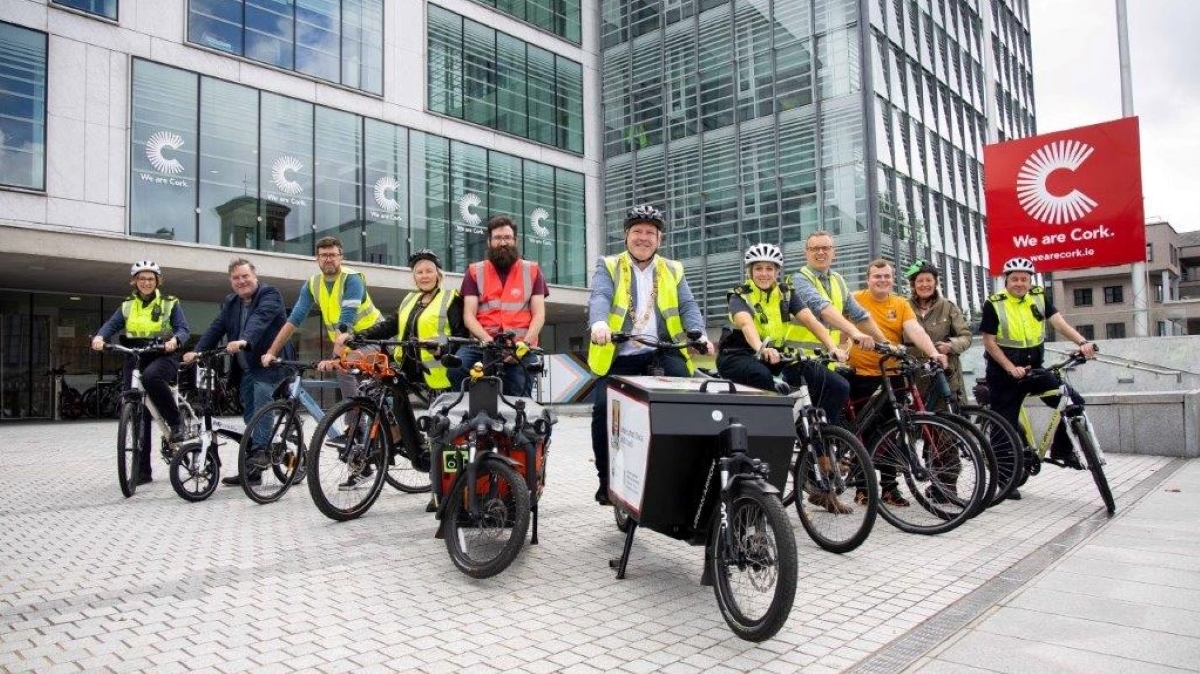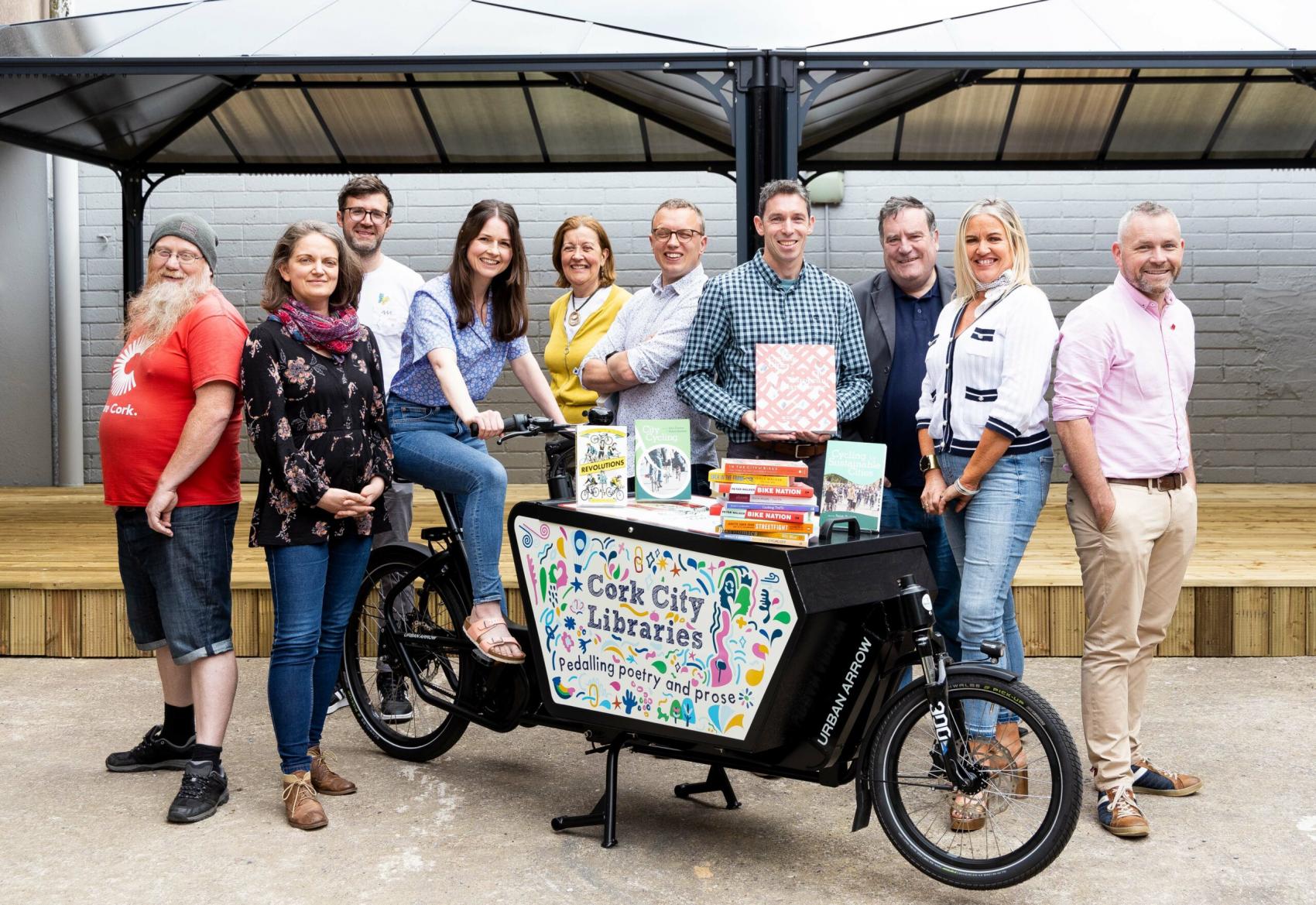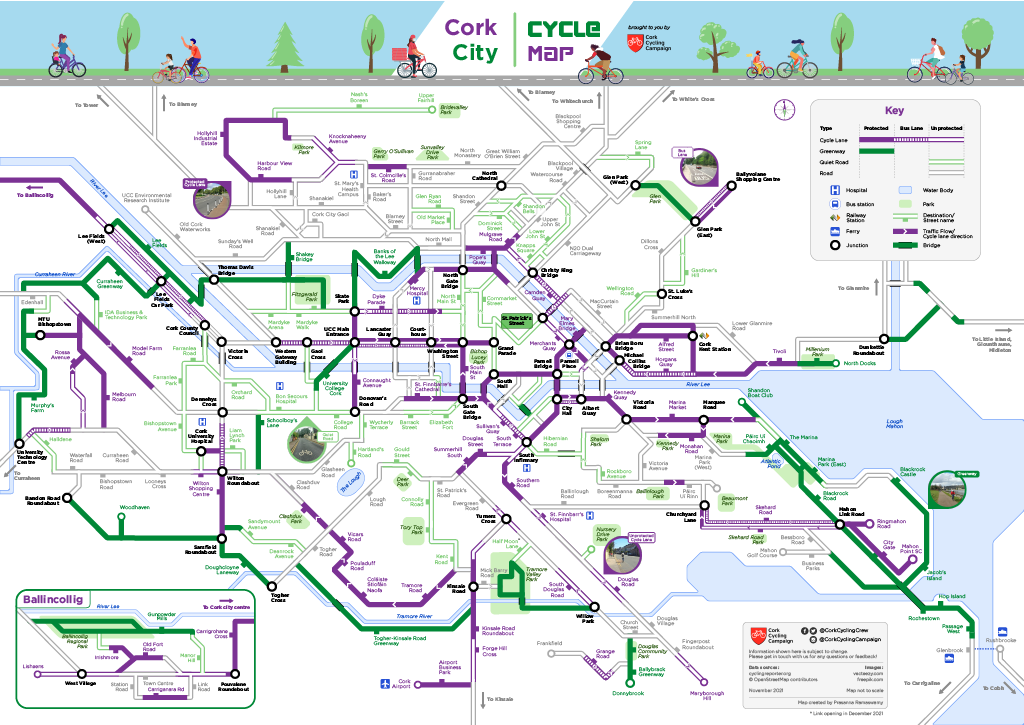
The importance of grassroot initiatives: Cork Cycling Campaign
ECF outlines the vital role that civil initiatives and soft measures play in creating a successful cycling city. We focus in on Cork Cycling Campaign to highlight good practices, effective strategies and useful local advocacy techniques.
Often when we consider what makes a successful cycling city, it is not uncommon to end up ruminating over familiar hard-line ideas and solutions: state-of-the-art cycling infrastructure, restructured traffic flows, safer bike-parking facilities, showers at work, etc, etc. While there is no denying that these are pragmatic actions to get more people on their bikes, it is quite easy to overlook other important, though less grandiose, soft mechanisms that can help inspire modal shift.
Soft measures implemented at the community level can have a big influence on behavioural change, a necessary complement for any aspiring cycling city. Simple things such as car-free days, cycle-to-school (or work) initiatives, cycling lessons and access to educational material can go a long way in changing people’s mindsets regarding cycling; and due to their relatively low-cost nature, the implementation of such measures does not have to rely on hard-fought government legislations or longwinded development strategies. Instead, they can be executed by local grassroot initiatives.
The role of grassroots initiatives
It is within this realm that members of Irish cycling initiative, Cork Cycling Campaign (CCC), have been working hard to improve the bicycle-friendliness of their hometown, Cork City. A city with a rich yet somewhat understated history of cycling, Cork is showing signs of improvement in its commitment to active mobility, with the Irish National Transport Authority proposing 54 km of new cycling and walking infrastructure as part of a new Sustainable Transport Corridors plan.
Despite this grand gesture, cycling in Cork today is still far from perfect, with the city boasting an outdated network design and a lack of investment in soft measures for cycling, as attested by CCC member Kevin Long. An engineer by trade, Kevin began to take an interest in cycling advocacy during the Covid-19 pandemic, which encouraged him to get more involved with CCC to see how he could contribute to the cause.
“When the streets were a bit quieter in Cork during the lockdown, I started to cycle a lot more around the place and notice a bit more about the city,” he explains. “It was after that I started getting more involved in the cycling campaign, and I’ve been involved ever since.”
An affiliate of ECF Member, cyclist.ie, Cork Cycling Campaign’s beginnings can be traced back to 1999, when likeminded people who wanted to make Cork more cycle-friendly crossed paths at a house party and decided to take action. Since then, the campaign has grown to a larger contingent of around 50 people, taking on new tasks to cover all aspects of cycling advocacy, including more soft measures.

Photo from CCC’s first cycling demonstration in 1999 (Source: Cork Cycling Campaign)
“When I first joined, the campaign was very much focused on submissions to planning applications. Every month there’d be max. ten people meeting in a pub to talk about what they’d write the submission about,” said Conn Donovan, CCC’s current chairperson.
“Then we slowly starting expanding and upskilling. When you look at where we are now – with press releases, social media, the website – it’s almost at a professional level. But that’s not because there’s any of us giving forty hours a week; it’s because there’s forty people giving two hours a week. The work is shared, and having that core group is really important to keep the show on the road.”
In 2021, the campaign won the inaugural Active Community Group award from the Cork Sports Partnership in recognition of its efforts in the community. CCC then used the proceeds from the award to produce this short video on cycling in Cork. The award and the resulting video are amongst a host of success stories that are helping the campaign gain more visibility across local media and actively change people’s minds and behaviours towards cycling.
Other soft measures have included donating a collection of cycling-related books to Cork City Libraries for UN World Bicycle Day, designing an easily navigable “why cycle” website landing page to demonstrate the benefits of cycling, producing a magnificent metro-style map of the Cork’s cycling network and organising multiple citizen participation activities, such as fun family cycles, cargo bike open days, school cycle buses and other activities for Bike Week Cork 2022.

CCC’s donation of cycling books to Cork City Libraries for UN World Bicycle Day (Source: Cork Cycling Campaign)
The campaign’s next big plan is already in the making, with a funding campaign underway to get Cork its very own edition of Cycling Cities, a renowned cycling research publication series from the Eindhoven University of Technology. The series covers cycling policy and practice from around the world and is widely regarded as an invaluable resource within the global cycling community, as attested by Dr. Damien O’Tuama, National Cycling Coordinator at ECF Member cyclist.ie.
"Cyclist.ie is delighted to see Cork Cycling Campaign digging into the rich history and culture of cycling in Cork, and linking that to plans to make everyday cycling central to the future of mobility in the city,” said Damien. “Given the quality of the Cycling Cities publications, this is a project that certainly deserves funding from the Irish authorities."
Despite their recent successes in promoting soft measures, Conn, Kevin and the rest of the campaign’s members have not forgotten about their other duties, with CCC still doing great work on hard-line activities. These include setting up a network of Citizen Science Telraam Counters in the city to build a picture of traffic and cycling levels on the streets of Cork and creating a consultations team to give their input on the upcoming Bus Connect plan, to name a few.
This two-pronged approach of promoting cycling through soft measures, while also ensuring that the campaign has a say on hard measures is an important strategy for any cycling initiative or campaign to consider.
Promotional video for cycling in Cork (Source: YouTube)
Civil initiatives: A vital part of sustainable local development
Within local democracy, it can often be the case that those who shout the loudest are the ones who get heard. But civil initiatives like CCC help ensure that the voices of cyclists are well-represented within civic dialogue, and that the development of cycling infrastructure is considered from the perspective of those who will actually use it the most – the cyclists.
“There’s a silent majority that wants better and safer cycling in the city. We know because time and time again we’ve done surveys, and we know that people would cycle a lot more if they felt it was safe to do so,” says Kevin. “We see ourselves as a voice for those that want safer cycling infrastructure – because there’s a loud enough voice from people that want to protect on-street parking or work against cycle lanes in some areas.”
As cities around the world recognise the need to increase transport sustainability, knowledge and research from grassroots movements is becoming more and more valuable to local councils, and it is here where grassroot initiatives can help influence policy in their locales.
“With climate action coming down the road, there’s a real urgency to get modal share shift,” points out Conn. “What we’re trying to do is bring our best practice research and the latest developments from other countries and places in Ireland and make sure that it is a: happening in Cork, and b: happening at the right pace. A classic example is Cork doesn’t have a dock-less bikeshare scheme at the moment. That’s something that’s in most European cities of our size.”
Conn’s words couldn’t be more relevant, aligning seamlessly with a new OECD report, Redesigning Ireland’s Transport for Net Zero, which states that the current mobility patterns in Ireland are incompatible with the country’s target to halve emissions in the transport sector by 2030. The report highlights the effectiveness of active mobility and on-demand shared services, like dock-less bikeshare schemes, as a means of reducing transport carbon emissions.
“That [the report] is something that we’ll make sure that councillors are aware of, that stakeholders are aware of,” explains Conn. “We’ll talk about it a lot, we’ll make press releases, and we’ll make sure that the issue doesn’t fall by the wayside or get forgotten about. We’re shining a light on things. We’re pushing to get them done.”

How to transform patterns of behaviour to a healthy transport system (Source: Redesigning Ireland’s Transport for Net Zero, OECD)
Applying the pressure
While soft measures are a great way to change public opinion, there will always exist a challenge in ensuring that local councillors act and bring in positive changes for cycling. For this, CCC recognises the need to be strategic in its approach and know where and with whom certain battles can be won.
“There’s always – on any issue – people on polar ends of the spectrum. But then there’s people in the middle. We appreciate that there’s a third or a quarter of our elected officials in Cork who’d be very pro-cycling,” says Conn. “Equally, there’s about a third or quarter who fundamentally disagree with cycling as a mode of transport and the need for it.
“Then we have the middle ground, those who understand the need to promote cycling, but are aware of concerns when you bring that idea down to the practical city level. And they’re the councillors we spend a lot of time working with.”
Conn describes approaches that can be as simple as calling or inviting councillors for a chat about issues concerned, all the while adopting the role of the “critical ally”, a method that relies on the core processes of professional respect, shared values, authentic presence and willingness to participate.
“There are instances where we’re on the same page as the local authority – we understand the pressures they’re under about funding and getting projects. But equally there are times where we have to be critical – and that’s a hard concept to grasp, to be critical but also trying to form a relationship.”

The metro-style map of Cork City’s cycling network (Source: Cork Cycling Campaign)
Any successful top-down plan needs a strong foundation at the bottom
Sustainable development at the local level is just not effective if it is entirely top down. Often investments and policy ambitions can struggle to be maintained if they’re not sufficiently supported by the public consensus. In this sense, community development requires exactly what its name suggests – action from the community, the social collective, and not just from high-level decisionmakers. It is here where citizen initiatives like the Cork Cycling Campaign play an important role.
But growing a campaign like CCC can be a challenge in itself, and the amount of work required to create a cycling city can often seem quite daunting or overwhelming. One key piece of advice offered by Conn for increasing any cycling initiative’s impact is quite simple: focus on building numbers.
“The time I’ve spent on bringing new members into the group and the influence that has had outweighs everything else by a factor of 50. If I had any advice for other groups, it would be to try and bring people into your organisation.”
ECF highly commends the work being done by the Cork Cycling Campaign, and believe it is important to share stories like theirs with the rest of the cycling community. Giving visibility and promoting knowledge sharing between grassroot initiatives is a vital part of ensuring more cycling can be achieved at the local level, as it is here where a lot of the hard work is being done.
If you know of any more stories like CCC’s or would like to learn more about how your grassroots cycling initiative can better achieve its goals, do not hesitate to get in touch.
Regions:
Contact the author
Recent news!
Upcoming events
Contact Us
Avenue des Arts, 7-8
Postal address: Rue de la Charité, 22
1210 Brussels, Belgium









